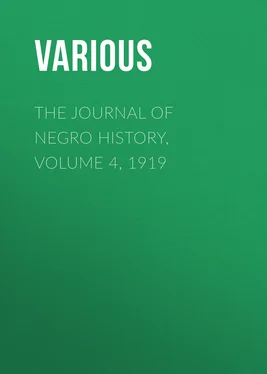Various - The Journal of Negro History, Volume 4, 1919
Здесь есть возможность читать онлайн «Various - The Journal of Negro History, Volume 4, 1919» — ознакомительный отрывок электронной книги совершенно бесплатно, а после прочтения отрывка купить полную версию. В некоторых случаях можно слушать аудио, скачать через торрент в формате fb2 и присутствует краткое содержание. Жанр: foreign_antique, periodic, История, foreign_edu, на английском языке. Описание произведения, (предисловие) а так же отзывы посетителей доступны на портале библиотеки ЛибКат.
- Название:The Journal of Negro History, Volume 4, 1919
- Автор:
- Жанр:
- Год:неизвестен
- ISBN:нет данных
- Рейтинг книги:5 / 5. Голосов: 1
-
Избранное:Добавить в избранное
- Отзывы:
-
Ваша оценка:
- 100
- 1
- 2
- 3
- 4
- 5
The Journal of Negro History, Volume 4, 1919: краткое содержание, описание и аннотация
Предлагаем к чтению аннотацию, описание, краткое содержание или предисловие (зависит от того, что написал сам автор книги «The Journal of Negro History, Volume 4, 1919»). Если вы не нашли необходимую информацию о книге — напишите в комментариях, мы постараемся отыскать её.
The Journal of Negro History, Volume 4, 1919 — читать онлайн ознакомительный отрывок
Ниже представлен текст книги, разбитый по страницам. Система сохранения места последней прочитанной страницы, позволяет с удобством читать онлайн бесплатно книгу «The Journal of Negro History, Volume 4, 1919», без необходимости каждый раз заново искать на чём Вы остановились. Поставьте закладку, и сможете в любой момент перейти на страницу, на которой закончили чтение.
Интервал:
Закладка:
A few years later in a speech in Springfield, Lincoln said: 6 6 In the same speech, Lincoln said: "I have said that the separation of the races is the only perfect preventive of amalgamation.... Such separation, if ever effected at all, must be effected by Colonization." The Works of Abraham Lincoln , Federal Edition, edited by A. B. Lapsley, II, p. 306.
"The enterprise is a difficult one, but where there is a will there is a way, and what colonization needs most is a hearty will. Will springs from the two elements of moral sense and self-interest. Let us be brought to believe it is morally right, and at the same time favorable to, or at least not against our interests to transfer the African to his native clime, and we shall find a way to do it, however great the task may be." 7 7 Nicolay and Hay, Speeches, Letters and State Papers, Abraham Lincoln , I, p. 235. Lincoln's Springfield Speech, June 26, 1857.
It is apparent, therefore, that before coming to the presidency, Lincoln had quite definite views on the matter of colonization. His interest arose not only with the good of the freedmen in view, but with the welfare of the white race in mind, as he is frank enough to state.
After being made President, the question of colonization arose again. Large numbers of slaves in the Confederate States not only became actually free by escape and capture but also legally free through the operation of the confiscation acts. In this new condition, their protection and care was to a considerable extent thrown upon the government. To solve this problem Lincoln decided upon a plan of compensated emancipation which would affect the liberation of slaves in the border States, and he further considered the future of the recently emancipated slaves and those to be freed. 8 8 Ibid. , VI, p. 356.
Taking up this question in his first annual message, he said: "It might be well to consider, too, whether the free colored people already in the United States could not so far as individuals may desire be included in such colonization," (meaning the colonization of certain persons who were held by legal claims to the labor and service of certain other persons, and by the act of confiscating property used for insurrectory purposes had become free, their claims being forfeited). "To carry out the plan of colonization may involve the acquiring of territory, and also the appropriation of money beyond that to be expended in the territorial acquisition. Having practiced the acquisition of territory for nearly sixty years, the question of constitutional power to do so is no longer an open one to us.... On this whole proposition, including the appropriation of money with the acquisition of territory, does not the expediency amount to absolute necessity—that without which the government itself cannot be perpetuated?" 9 9 Richardson, Messages and Papers of the Presidents , VI, p. 54. First Annual Message, December 3, 1861.
Congress responded to this recommendation in separate acts, providing in an act, April 16, 1862, for the release of certain persons held to service or labor in the District of Columbia, including those to be liberated by this act, as may desire to emigrate to the Republic of Hayti or Liberia, or such other country beyond the limits of the United States, as the President may determine, provided the expenditure does not exceed one hundred dollars for each immigrant. 10 10 Section XI of Act approved April 16, 1862.
The act provided that the sum of $100,000 out of any money in the Treasury should be expended under the direction of the President to aid the colonization and settlement of such persons of African descent now residing in the District of Columbia. 11 11 Nicolay and Hay, Abraham Lincoln , VI, p. 356. Act approved July 16, 1862.
It further provided that later, on July 16, an additional appropriation of $500,000 should be used in securing the colonization of free persons. 12 12 Raymond, Life, Public Services and State Papers , p. 504.
A resolution directly authorizing the President's participation provided "that the President is hereby authorized to make provision for the transportation, colonization and settlement in some tropical country beyond the limits of the United States, of such persons of the African race, made free by the provisions of this act, as may be willing to emigrate, having first obtained the consent of the government of said country to their protection and settlement within the same, with all the rights and privileges of freemen." 13 13 Nicolay and Hay, Abraham Lincoln , VI, p. 357.
The consent of Congress was given under protest and opposition from some individual members. Charles Sumner in and out of Congress attacked the plan with vigor, 14 14 Charles Sumner in a speech before a State Committee in Massachusetts, said: "A voice from the west—God save the west—revives the exploded theory of colonization, perhaps to divert attention from the great question of equal rights. To that voice, I reply, first, you ought not to do it, and secondly, you cannot do it. You ought not to do it, because besides its intrinsic and fatal injustice, you will deprive the country of what it most needs, which is labor. Those freedmen on the spot are better than mineral wealth. Each is a mine, out of which riches can be drawn, provided you let him share the product, and through him that general industry will be established which is better than anything but virtue, and is, indeed, a form of virtue. It is vain to say that this is a white man's country. It is the country of man. Whoever disowns any member of the human family as brother disowns God as father, and thus becomes impious as well as inhuman. It is the glory of republican institutions that they give practical form to this irresistible principle. If anybody is to be sent away, let it be the guilty and not the innocent."— Charles Sumner's Complete Works , XII, Section 3, p. 334.
but in spite of this opposition the recommendation was carried.
On several occasions Lincoln seized the opportunity to present his views and plans to visiting groups and committees. On July 16, 1862, when the President was desirous of securing the interest of the border State representatives in favor of compensated emancipation the plan for colonization came to light. His appeal to these representatives was: "I do not speak of emancipation at once but of a decision to emancipate gradually. Room in South America for colonization can be obtained cheaply and in abundance, and when numbers shall be large enough to be company and encouragement to one another the freed people will not be so reluctant to go." 15 15 Nicolay and Hay, Complete Works of Abraham Lincoln , II, p. 205. Nicolay and Hay, A History of Abraham Lincoln , VI, p. 356.
Again on the afternoon of August 14, 1862, the President gave an audience to a committee of men of color at the White House. They were introduced by Rev. J. Mitchell, Commissioner of Emigration. E. M. Thomas, the chairman, remarked that they were there by invitation to hear what the executive had to say to them. Having all been seated the President informed them that a sum of money had been appropriated by Congress and placed at his disposal for the purpose of aiding colonization in some country, of the people, or a portion of those of African descent, thereby making it his duty as it had been for a long time his inclination to favor that cause. "And why," he asked, "should the people of your race be colonized and where? Why should they leave this country? You and we are different races. We have between us a broader difference than exists between almost any other two races. Whether it is right or wrong I need not discuss, but this physical difference is a great disadvantage to us both, as I think. Your race suffer very greatly, many of them, by living among us, while ours suffer from your presence. In a word we suffer on each side. If this is admitted it affords a reason why we should be separated. If we deal with those who are not free at the beginning and whose intellects are clouded by slavery we have very poor material to start with. If intelligent colored men, such as are before me, would move in this matter much might be accomplished. It is exceedingly important that we have men at the beginning capable of thinking as white men and not those who have been systematically opposed."
Читать дальшеИнтервал:
Закладка:
Похожие книги на «The Journal of Negro History, Volume 4, 1919»
Представляем Вашему вниманию похожие книги на «The Journal of Negro History, Volume 4, 1919» списком для выбора. Мы отобрали схожую по названию и смыслу литературу в надежде предоставить читателям больше вариантов отыскать новые, интересные, ещё непрочитанные произведения.
Обсуждение, отзывы о книге «The Journal of Negro History, Volume 4, 1919» и просто собственные мнения читателей. Оставьте ваши комментарии, напишите, что Вы думаете о произведении, его смысле или главных героях. Укажите что конкретно понравилось, а что нет, и почему Вы так считаете.












